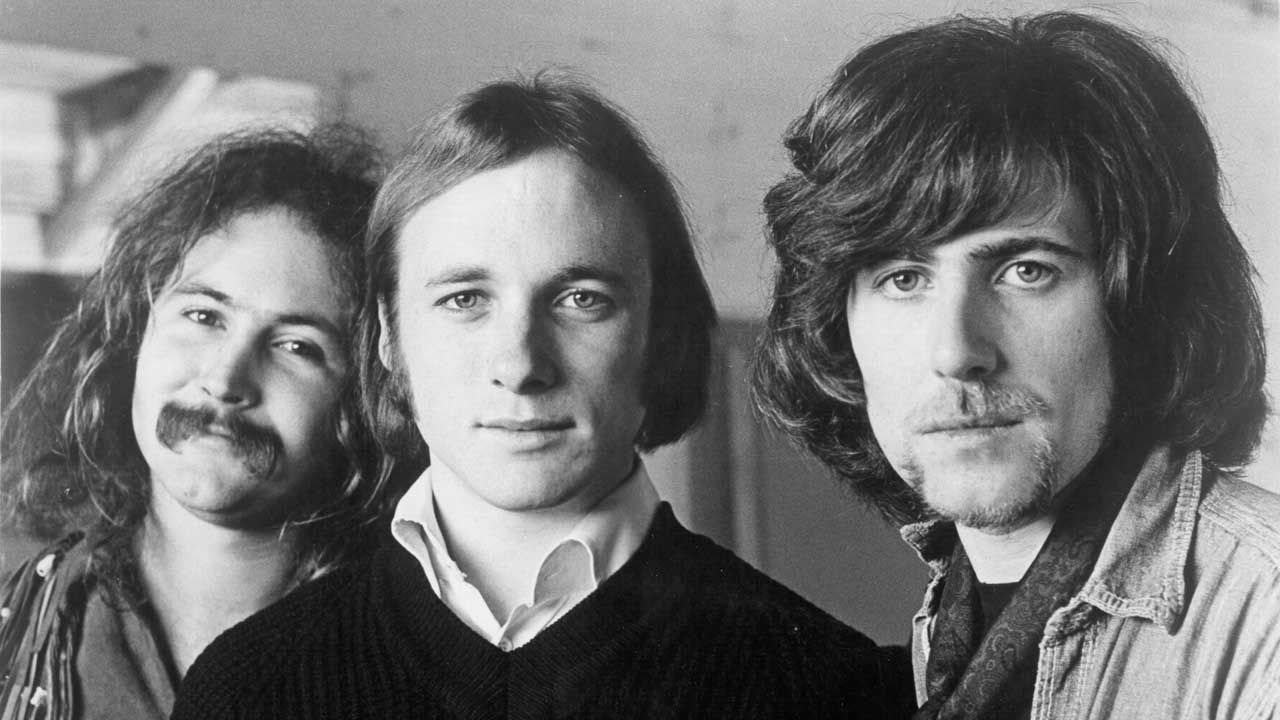10 Best Crosby, Stills and Nash Songs of All Time

Crosby, Stills, and Nash (CSN) are one of the most iconic American rock bands of all time, known for their timeless folk rock music and intricate vocal harmonies. The band was formed in 1968 by David Crosby, Stephen Stills, and Graham Nash, and later joined by Neil Young, creating the legendary Crosby, Stills, Nash & Young supergroup. Over the years, CSN have produced a wide range of classic songs that have stood the test of time and continue to inspire new generations of music lovers.
In this article, we will explore the 10 best Crosby, Stills, and Nash songs of all time, looking at the lyrics, musical arrangements, and the cultural impact of each song. From the infectious melodies of “Marrakesh Express” and “Carry On,” to the poignant ballads of “Helplessly Hoping” and “Our House,” this list captures the very best of CSN’s prolific career. Whether you are a longtime fan of the band or discovering their music for the first time, these songs are a must-listen for anyone who appreciates the power and beauty of classic rock music.
1. ‘Suite: Judy Blue Eyes’
“Suite: Judy Blue Eyes” is a classic folk rock song by the American supergroup Crosby, Stills, and Nash, released in 1969. The song is a medley of different sections, each with its distinct melody and lyrics, seamlessly blending into a cohesive whole. It is known for its intricate vocal harmonies and poetic lyrics that capture the essence of the late 1960s counterculture.
The song is about the romantic relationship between Stephen Stills and his then-girlfriend, Judy Collins, and the emotional journey they went through together. The lyrics describe the ups and downs of their relationship, from the initial attraction and excitement (“It’s getting to the point where I’m no fun anymore”) to the pain of separation and loss (“Tears on the sleeve of a man / Don’t wanna be a boy today”).
Musically, “Suite: Judy Blue Eyes” is a tour de force of folk rock instrumentation, featuring acoustic guitars, bass, drums, and percussion. The song’s structure is complex, with multiple sections that flow seamlessly into one another, building to a powerful crescendo of vocal harmonies and instrumentation.
Overall, “Suite: Judy Blue Eyes” is a timeless classic that captures the essence of the late 1960s counterculture. Its intricate harmonies, poetic lyrics, and complex musical structure make it a masterpiece of the folk rock genre and a testament to the enduring power of great music.
2. ‘Ohio’
“Ohio” is a protest song by the American supergroup Crosby, Stills, Nash & Young, released in 1970. The song was written in response to the Kent State shootings that occurred on May 4, 1970, where four unarmed students were killed by Ohio National Guardsmen during a peaceful protest against the Vietnam War.
The song’s lyrics express anger and frustration at the government’s handling of the protest and the war. The opening lines “Tin soldiers and Nixon’s coming / We’re finally on our own” set the scene for the rest of the song’s scathing critique of the establishment.
Musically, “Ohio” is a driving rock song with distorted guitar riffs and pounding drums that add to the sense of urgency and anger in the lyrics. The vocal harmonies between Crosby, Stills, Nash, and Young are powerful and passionate, with the refrain of “Four dead in Ohio” serving as a haunting reminder of the tragedy that inspired the song.
Overall, “Ohio” is a powerful protest song that captures the spirit of a generation’s anger and frustration towards the Vietnam War and the government’s response to dissent. Its raw emotion and powerful lyrics continue to resonate with audiences today, making it a timeless classic of the protest song genre.
3. ‘Helpless’
“Helpless” is a melancholic yet beautiful folk rock song by Crosby, Stills, and Nash, released in 1969. The song was written by Canadian singer-songwriter Neil Young and features his signature emotive vocal style and poetic lyrics.
The song’s lyrics describe a feeling of helplessness and vulnerability in the face of life’s challenges, with lines such as “There is a town in north Ontario / With dream comfort memory to spare / And in my mind, I still need a place to go / All my changes were there.” The vulnerability and raw emotion in the lyrics are mirrored in the gentle acoustic guitar and haunting vocal harmonies of Crosby, Stills, and Nash, creating a powerful and introspective atmosphere.
Musically, “Helpless” is characterized by its simple yet effective arrangement, featuring acoustic guitars, bass, and percussion. The song’s instrumentation is minimal, with each element carefully crafted to support the song’s introspective mood and emotional depth.
Overall, “Helpless” is a hauntingly beautiful song that captures the essence of Neil Young’s songwriting and the vocal harmonies of Crosby, Stills, and Nash. Its powerful lyrics and gentle, introspective atmosphere make it a timeless classic of the folk rock genre, resonating with audiences across generations.
4. ‘Woodstock’
“Woodstock” is a classic folk rock song by the American supergroup Crosby, Stills, and Nash, released in 1970. The song was written by Canadian singer-songwriter Joni Mitchell and inspired by her experiences at the Woodstock music festival in 1969.
The song’s lyrics celebrate the spirit of unity and hope that characterized the Woodstock festival, with lines such as “We are stardust, we are golden / And we’ve got to get ourselves back to the garden.” The lyrics evoke a sense of nostalgia and longing for a simpler, more peaceful time, while also recognizing the challenges of the present moment.
Musically, “Woodstock” is characterized by its gentle acoustic guitar and soaring vocal harmonies, which capture the optimism and sense of community that characterized the Woodstock festival. The song’s arrangement is simple yet effective, featuring acoustic guitar, bass, and percussion, with occasional bursts of electric guitar and organ adding to the song’s dynamic range.
Overall, “Woodstock” is a classic protest song that captures the spirit of the late 1960s counterculture and the Woodstock festival’s legacy. Its powerful lyrics and gentle, introspective atmosphere make it a timeless classic of the folk rock genre, resonating with audiences across generations.
5. ‘Carry On’
“Carry On” is a classic rock song by the American supergroup Crosby, Stills, Nash & Young, released in 1970. The song is known for its intricate vocal harmonies and driving rock instrumentation, featuring electric guitars, bass, drums, and percussion.
The song’s lyrics express a message of perseverance and hope in the face of adversity, with lines such as “Carry on, love is coming / Love is coming to us all.” The song’s chorus, with its repetition of the phrase “Carry on,” serves as a powerful reminder of the strength and resilience of the human spirit.
Musically, “Carry On” is characterized by its intricate instrumental passages and driving rock rhythms, creating a powerful and dynamic sound that builds to a rousing chorus. The vocal harmonies between Crosby, Stills, Nash, and Young are a standout feature of the song, with each member contributing their unique vocal style to create a rich and textured sound.
Overall, “Carry On” is a timeless classic of the rock genre that captures the spirit of perseverance and hope that defined the 1970s counterculture. Its powerful lyrics and dynamic instrumentation continue to resonate with audiences today, making it a classic rock anthem that stands the test of time.
6. ‘Long Time Gone’
“Long Time Gone” is a folk rock song by Crosby, Stills, and Nash, released in 1969. The song was written by David Crosby and expresses a sense of disillusionment and frustration with the state of the world and the political establishment.
The song’s lyrics criticize the hypocrisy and corruption of those in power, with lines such as “Speak out, you got to speak out against the madness / You got to speak your mind if you dare.” The song’s message of social and political activism is tempered with a sense of sadness and regret, as reflected in the line “It’s been a long time coming, it’s going to be a long time gone.”
Musically, “Long Time Gone” is characterized by its gentle acoustic guitar and vocal harmonies, creating a mellow and introspective atmosphere. The song’s arrangement is simple yet effective, with occasional bursts of electric guitar and percussion adding to the song’s dynamic range.
Overall, “Long Time Gone” is a timeless classic of the folk rock genre that captures the spirit of social and political activism of the late 1960s. Its powerful lyrics and gentle, introspective atmosphere make it a poignant reflection on the state of the world, resonating with audiences across generations.
7. ‘Our House’
“Our House” is a classic folk rock song by the American supergroup Crosby, Stills, and Nash, released in 1970. The song was written by Graham Nash and is a tribute to domestic bliss and the joys of home life.
The song’s lyrics describe a peaceful and idyllic domestic scene, with lines such as “Life used to be so hard / Now everything is easy ’cause of you.” The song’s catchy melody and simple, straightforward lyrics evoke a sense of warmth and nostalgia, capturing the simple pleasures of love and family.
Musically, “Our House” is characterized by its gentle acoustic guitar and piano, creating a mellow and introspective atmosphere. The song’s vocal harmonies between Crosby, Stills, and Nash are a standout feature of the song, with each member contributing their unique vocal style to create a rich and textured sound.
Overall, “Our House” is a timeless classic of the folk rock genre that captures the spirit of love and domestic bliss. Its catchy melody and simple, heartfelt lyrics continue to resonate with audiences today, making it a beloved classic of the Crosby, Stills, and Nash discography.
8. Teach Your Children’
“Teach Your Children” is a classic folk rock song by the American supergroup Crosby, Stills, Nash & Young, released in 1970. The song was written by Graham Nash and reflects his desire to encourage parents to instill positive values and teachings in their children.
The song’s lyrics contain a timeless message of hope and unity, with lines such as “Teach your children well, their father’s hell did slowly go by / And feed them on your dreams, the one they pick’s the one you’ll know by.” The song’s message is one of optimism and faith in the power of education and positive parenting to create a better world for future generations.
Musically, “Teach Your Children” is characterized by its gentle acoustic guitar, piano, and vocal harmonies, creating a mellow and uplifting atmosphere. The song’s vocal harmonies between Crosby, Stills, Nash, and Young are a standout feature of the song, with each member contributing their unique vocal style to create a rich and textured sound.
Overall, “Teach Your Children” is a timeless classic of the folk rock genre that continues to resonate with audiences today. Its message of hope and unity, combined with its gentle instrumentation and powerful vocal harmonies, make it a beloved classic of the Crosby, Stills, Nash & Young discography.
9. ‘Just a Song Before I Go’
“Just a Song Before I Go” is a folk rock song by Crosby, Stills, and Nash, released in 1977. The song was written by Graham Nash and reflects his feelings of separation and longing for a loved one.
The song’s lyrics contain a simple yet poignant message, with lines such as “Just a song before I go, to whom it may concern / Traveling twice the speed of sound, it’s easy to get burned.” The song’s message is one of bittersweet farewell and the desire to express one’s feelings before parting ways.
Musically, “Just a Song Before I Go” is characterized by its gentle acoustic guitar and piano, creating a mellow and introspective atmosphere. The song’s vocal harmonies between Crosby, Stills, and Nash are a standout feature of the song, with each member contributing their unique vocal style to create a rich and textured sound.
Overall, “Just a Song Before I Go” is a touching and intimate song that captures the spirit of separation and longing. Its simple yet powerful lyrics, combined with its gentle instrumentation and beautiful vocal harmonies, make it a standout track in the Crosby, Stills, and Nash discography.
10. ‘Marrakesh Express’
“Marrakesh Express” is a folk rock song by Crosby, Stills, and Nash, released in 1969. The song was written by Graham Nash and was inspired by his trip to Morocco, where he experienced the sights and sounds of the country’s bustling train stations.
The song’s lyrics contain a sense of adventure and exploration, with lines such as “Looking at the world through the sunset in your eyes / Traveling the train through clear Moroccan skies.” The song’s message is one of excitement and wonder at the exotic locales and cultures of the world.
Musically, “Marrakesh Express” is characterized by its upbeat tempo and catchy melody, featuring a mix of acoustic and electric guitars, a groovy bassline, and rhythmic percussion. The song’s vocal harmonies between Crosby, Stills, and Nash are a standout feature of the song, with each member contributing their unique vocal style to create a dynamic and energetic sound.
Overall, “Marrakesh Express” is a classic folk rock song that captures the spirit of adventure and wanderlust. Its catchy melody and upbeat instrumentation, combined with its evocative lyrics, make it a beloved classic of the Crosby, Stills, and Nash discography.


Simon Robinson is a frequent contributor to Singers Room. Since 2005, Singersroom has been the voice of R&B around the world. Connect with us via social media below.
link







